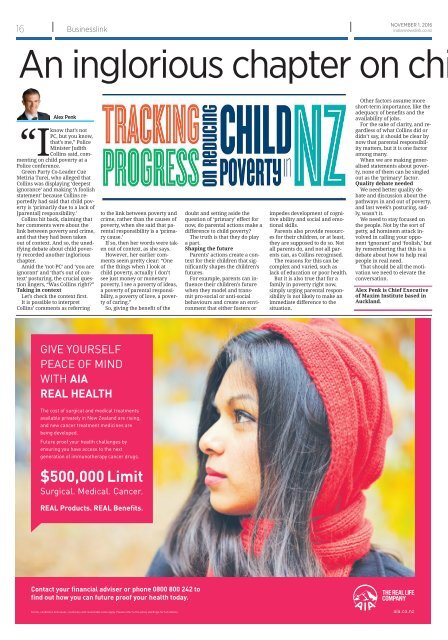Create successful ePaper yourself
Turn your PDF publications into a flip-book with our unique Google optimized e-Paper software.
16<br />
Businesslink<br />
NOVEMBER 1, <strong>2016</strong><br />
An inglorious chapter on chi<br />
Alex Penk<br />
“I<br />
know that’s not<br />
PC, but you know,<br />
that’s me,” Police<br />
Minister Judith<br />
Collins said, commenting<br />
on child poverty at a<br />
Police conference.<br />
Green Party Co-Leader Cue<br />
Metiria Turei, who alleged that<br />
Collins was displaying ‘deepest<br />
ignorance’ and making ‘A foolish<br />
statement’ because Collins reportedly<br />
had said that child poverty<br />
is ‘primarily due to a lack of<br />
[parental] responsibility.’<br />
Collins hit back, claiming that<br />
her comments were about the<br />
link between poverty and crime,<br />
and that they had been taken<br />
out of context. And so, the unedifying<br />
debate about child poverty<br />
recorded another inglorious<br />
chapter.<br />
Amid the ‘not-PC’ and ‘you are<br />
ignorant’ and ‘that’s out of context’<br />
posturing, the crucial question<br />
lingers, “Was Collins right?”<br />
Taking in context<br />
Let’s check the context first.<br />
It is possible to interpret<br />
Collins’ comments as referring<br />
to the link between poverty and<br />
crime, rather than the causes of<br />
poverty, when she said that parental<br />
responsibility is a ‘primary<br />
cause.’<br />
If so, then her words were taken<br />
out of context, as she says.<br />
However, her earlier comments<br />
seem pretty clear: “One<br />
of the things when I look at<br />
child poverty, actually I don’t<br />
see just money or monetary<br />
poverty, I see a poverty of ideas,<br />
a poverty of parental responsibility,<br />
a poverty of love, a poverty<br />
of caring.”<br />
So, giving the benefit of the<br />
doubt and setting aside the<br />
question of ‘primary’ effect for<br />
now, do parental actions make a<br />
difference to child poverty?<br />
The truth is that they do play<br />
a part.<br />
Shaping the future<br />
Parents’ actions create a context<br />
for their children that significantly<br />
shapes the children’s<br />
futures.<br />
For example, parents can influence<br />
their children’s future<br />
when they model and transmit<br />
pro-social or anti-social<br />
behaviours and create an environment<br />
that either fosters or<br />
impedes development of cognitive<br />
ability and social and emotional<br />
skills.<br />
Parents also provide resources<br />
for their children, or at least,<br />
they are supposed to do so. Not<br />
all parents do, and not all parents<br />
can, as Collins recognised.<br />
The reasons for this can be<br />
complex and varied, such as<br />
lack of education or poor health.<br />
But it is also true that for a<br />
family in poverty right now,<br />
simply urging parental responsibility<br />
Is not likely to make an<br />
immediate difference to the<br />
situation.<br />
Other factors assume more<br />
short-term importance, like the<br />
adequacy of benefits and the<br />
availability of jobs.<br />
For the sake of clarity, and regardless<br />
of what Collins did or<br />
didn’t say, it should be clear by<br />
now that parental responsibility<br />
matters, but it is one factor<br />
among many.<br />
When we are making generalised<br />
statements about poverty,<br />
none of them can be singled<br />
out as the ‘primary’ factor.<br />
Quality debate needed<br />
We need better quality debate<br />
and discussion about the<br />
pathways in and out of poverty,<br />
and last week’s posturing, sadly,<br />
wasn’t it.<br />
We need to stay focused on<br />
the people. Not by the sort of<br />
petty, ad hominem attack involved<br />
in calling your opponent<br />
‘ignorant’ and ‘foolish,’ but<br />
by remembering that this is a<br />
debate about how to help real<br />
people in real need.<br />
That should be all the motivation<br />
we need to elevate the<br />
conversation.<br />
Alex Penk is Chief Executive<br />
of Maxim Institute based in<br />
Auckland.<br />
GIVE YOURSELF<br />
PEACE OF MIND<br />
WITH AIA<br />
REAL HEALTH<br />
The cost of surgical and medical treatments<br />
availableprivatelyinNew Zealand arerising,<br />
and newcancer treatment medicines are<br />
being developed.<br />
Futureproof your health challenges by<br />
ensuring youhaveaccess to the next<br />
generation of immunotherapy cancer drugs.<br />
$500,000 Limit<br />
Surgical. Medical. Cancer.<br />
REAL Products. REAL Benefits.<br />
Contact your financial adviser or phone 0800 800 242 to<br />
find out howyou canfutureproof your health today.<br />
Terms, conditions and usual, customary and reasonable rules apply. Please referto the policy wordings for full details.<br />
aia.co.nz


















